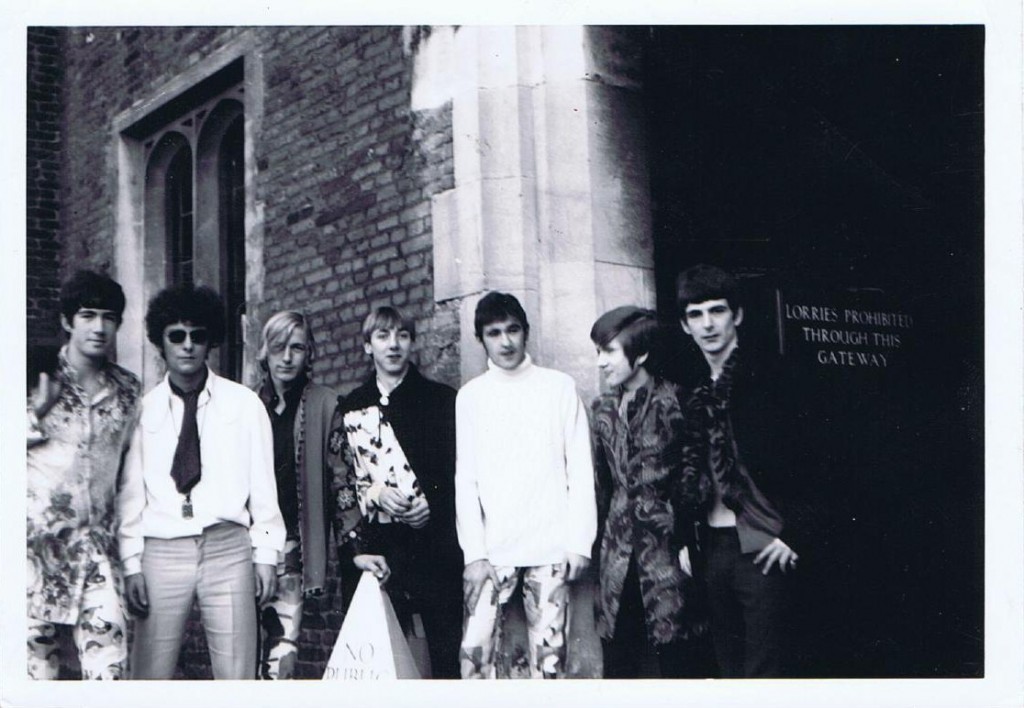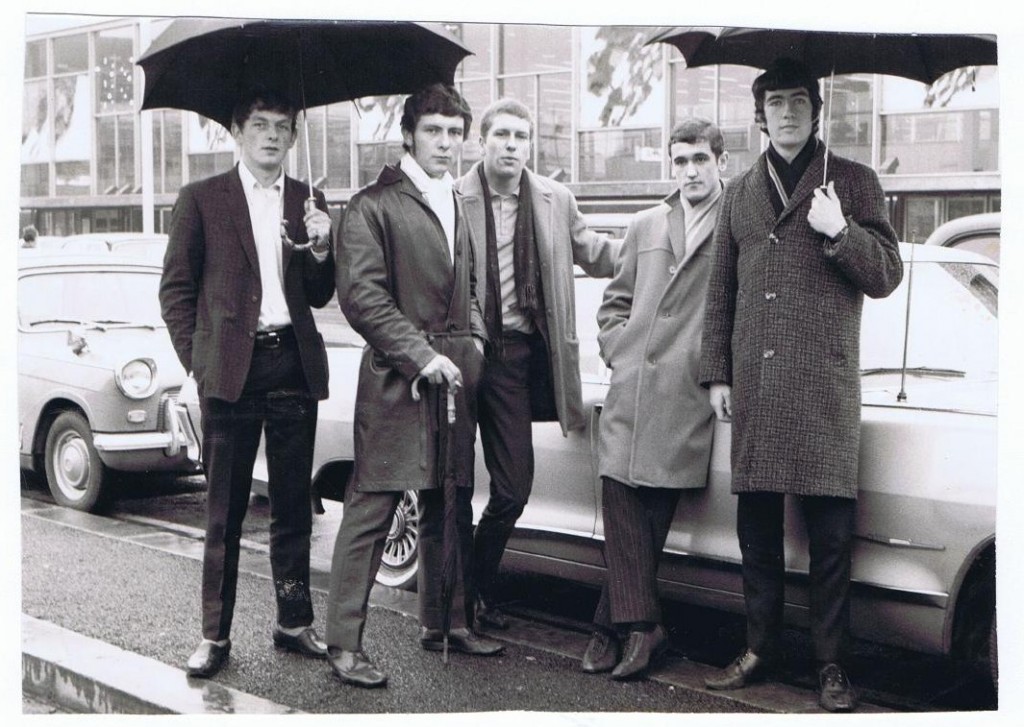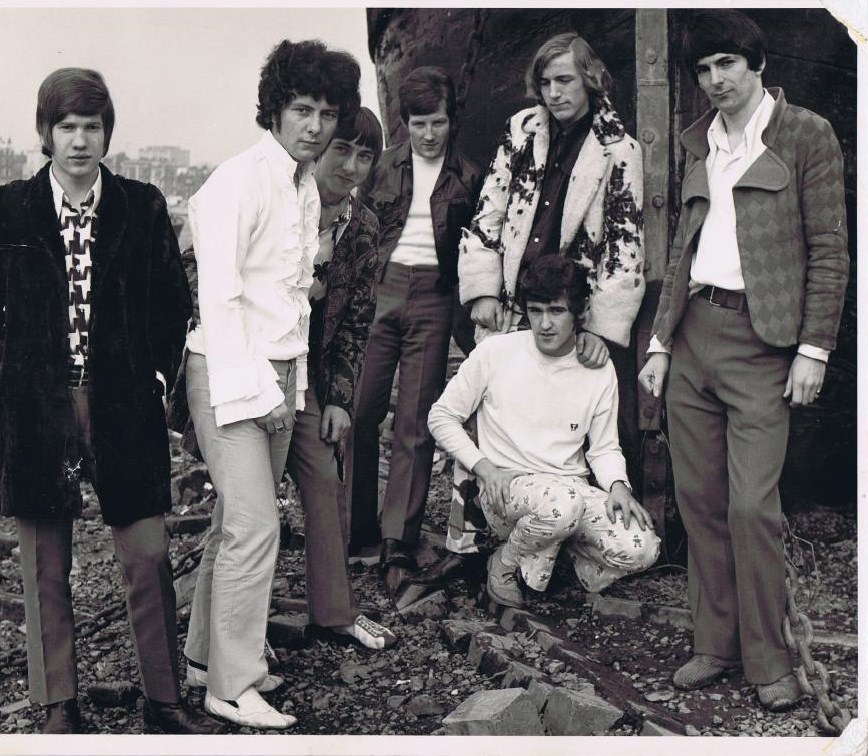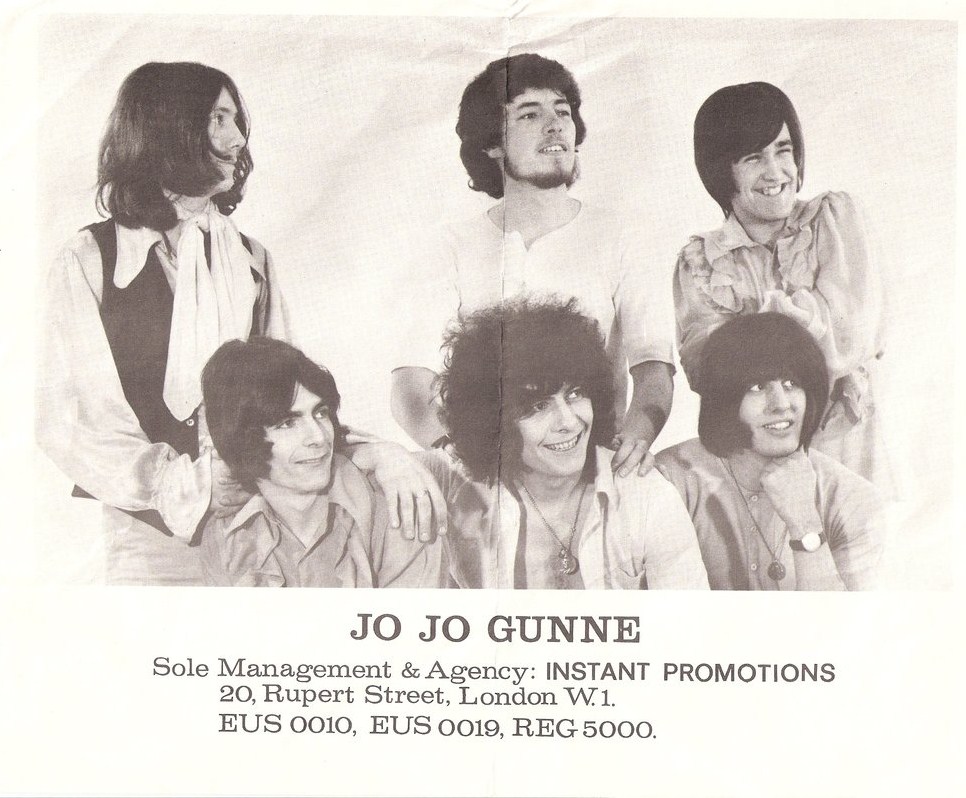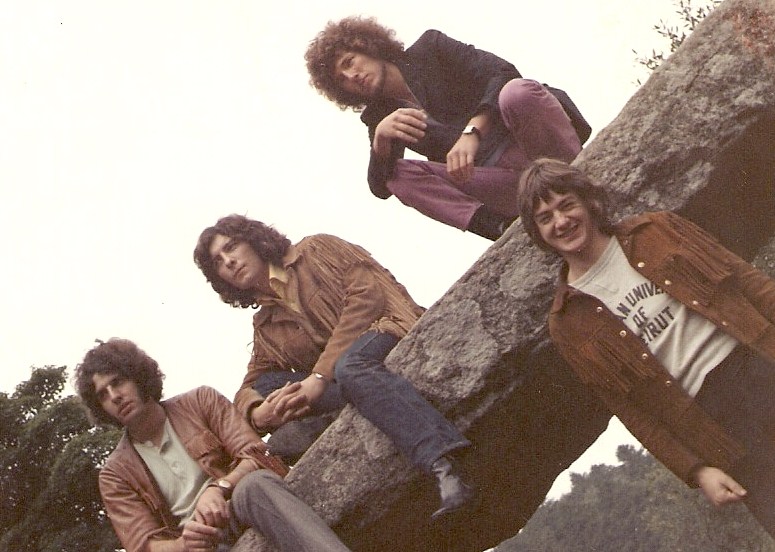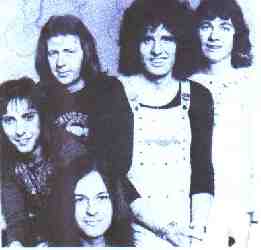By Nick Warburton
Readers will be familiar with the American early 1970s rock band Jo Jo Gunne, helmed by former Spirit members Jay Ferguson and Mark Andes.
However, the first band to use the name Jo Jo Gunne was in fact a little known British R&B outfit, formed at Debrome school in Feltham, Middlesex in early-to-mid 1965.
Jo Jo Gunne, Hampton Court Palace (October/ November) 1967, left to right: Tom Marshall, Alan Barratt, Alan Townsend, Ronny Butterworth, Paul Maher, Simon Spackman and Don BaxThe original line up comprised:
- Ronny Butterworth – lead vocals
- Simon Spackman – lead guitar
- Don Bax – rhythm guitar
- Alan Townsend – bass
- Doug Gordon – drums
However, later that year the musicians made the decision to move in a more soul direction and took on a new lead singer, Pete Pennycate, to accommodate the new configuration. Spackman moved from lead guitar to keyboards to allow newcomer Renwick MacDonald to join from local rivals Themselves (who subsequently morphed into Virgin Sleep) while Butterworth and Townsend focused on trumpets and Bax took up the bass position. By early 1966, Jo Jo Gunne comprised:
- Pete Pennycate – lead vocals
- Renwick MacDonald – lead guitar
- Simon Spackman – organ
- Don Bax – bass
- Alan Townsend – trumpet and trombone
- Ronny Butterworth – trumpet
- Doug Gordon – drums
Jo Jo Gunne, late 1965/early 1966 at Saint Francis Church Hall (left to right) Don Bax, Renwick MacDonald, Alan Townsend, Doug Gordon, Ronny Butterworth, Pete Pennycate. (Photo from Ronny Butterworth)
Over the next 18 months, this line up (minus Butterworth who dropped out around November 1966 to play with Twickenham band, The All Night Workers) played the following gigs:
- 19 March 1966 – London Cavern, London
- 12 April 1966 – 100 Club, London with The Pretty Things
- 17 April 1966 – Imperial Ballroom, Nelson, Lancashire with The Generation
- 12 August 1966 – Cellar Club, Kingston Upon Thames, Surrey
- 6 January 1967 – Tiles, London with Alvin Cash & The Crawlers (billed as Jo Jo Gunn)
- 13 January 1967 – The Flamingo, London with Derek Savage Foundation (billed as Jo Jo Gunn)
- 17 February 1967 – Upper Cut, Forest Gate, London with The New Pirates and The Afex
- 18 February 1967 – Flamingo, London with The All Night Workers
- 5 March 1967 – New Yorker Discotheque, Swindon, Wiltshire with The Iveys and The Inspiration
- 10 March 1967 – The New All Star Club, Liverpool Street, London
In August 1967, Jo Jo Gunne underwent the first of a number of significant personnel changes that saw singer Alan Barratt take over from Pete Pennycate on lead vocals. Barratt had started out singing with another local band, The Penny Blacks, which also included lead guitarist Tom Marshall; rhythm guitarist John Day; bass player Dave Arnold; and drummer Paul Maher.
The Penny BlacksWhen Barratt joined Jo Jo Gunne that summer he also brought Paul Maher with him, who took over from Doug Gordon. The Penny Blacks had played regularly on the west London scene in the early-mid 1960s and on one occasion played a youth club in West Drayton along with two other local bands called The Sovereigns and The Birds, who at the time included (in the former band) Mick Underwood (once of The Outlaws) and (in the latter’s case) Ronnie Wood, as well as Kim Gardener (later in Ashton, Gardener and Dyke).
According to Alan Barratt, his and Maher’s debut with Jo Jo Gunne took place on 8 September 1967 at the California Ballroom in Dunstable.
In late 1967, Jo Jo Gunne signed a deal with Don Arden’s Starlight Agency after Amen Corner’s singer Andy Fairweather-Low recommended the band to the infamous promoter. Amen Corner and Jo Jo Gunne had shared a billing at the California Ballroom in Dunstable on 29 September 1967 alongside rival west London band, The All Night Workers.
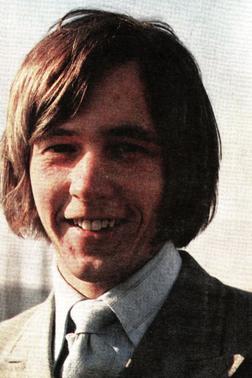 Andy Fairweather-Low
Andy Fairweather-Low
The All Night Workers would maintain a close link with Jo Jo Gunne and several musicians would play with both bands. The first of these was trumpet player Ronny Butterworth, who re-joined Jo Jo Gunne from The All Night Workers around early October. By then, the band’s line up comprised:
- Alan Barratt – lead vocals
- Renwick MacDonald – lead guitar
- Simon Spackman – organ
- Don Bax – bass
- Alan Townsend – trumpet and trombone
- Ronny Butterworth – trumpet
- Paul Maher – drums
However, not long after Butterworth’s arrival, lead guitar player Renwick MacDonald left and another former Penny Blacks member, lead guitarist Tom Marshall joined the line up for the rest of 1967 and into spring 1968.
When Marshall left around February/March 1968 to join The Playground (and subsequently Harmony Grass and Capability Brown), Spackman moved from organ to lead guitar and keyboard player Ken Carroll joined Jo Jo Gunne.
Carroll had spent the past few months playing with a band called Deep Purple, which had been formed in late 1967, some six months before the more famous version (although there was also a Norwich band that used the name in 1967).
Jo Jo Gunne, Spring 1968 (left to right) Simon Spackman, Alan Barratt, Ron Butterworth, Ken Carroll, Alan Townsend, Paul Maher, Don BaxThe following concert dates are taken from this period:
- 8 September 1967 – California Ballroom, Dunstable with James and Bobby Purify and The Yum Yum Band
- 23 September 1967 – Hemel Hempstead Pavilion, Hemel Hempstead with The Herd
- 29 September 1967 – California Ballroom, Dunstable with Amen Corner and The All Night Workers
- 1 October 1967 – Starlight Ballroom, Crawley with The Move (spelt Jo Jo Gun)
- 15 October 1967 – Starlight Ballroom, Crawley with The Jimi Hendrix Experience
- 20 October 1967 – Pavilion, Southend with The Mindbenders
- 21 October 1967 – Wimbledon Palais with Tony Rivers and The Castaways
- 27 October 1967 – London School of Economics with Elmer Gantry’s Velvet Opera
- 11 November 1967 – California Ballroom, Dunstable with The Symbols and The Fifth Dynasty (spelt Jo Jo Gunn)
- 12 November 1967 – Starlight Ballroom, Crawley with Modes Mode
- 17 November 1967 – Southlands College, Roehampton, Surrey with The Nashville Teens
- 24 November 1967 – California Ballroom, Dunstable with The Shevelles and The Crew
- 9 December 1967 – Boston Gliderdrome, Lincolnshire with Jimmy James & The Vagabonds, Reformation and Ray Bones (billed as Jo-Jo Gun Band)
- 24 December 1967 – Starlight Ballroom, Crawley with The Exits
- 31 December 1967 – Starlight Ballroom, Crawley
- 21 January 1968 – Starlite Ballroom, Greenford with Ronnie Jones
- 28 January 1968 – Carlton Club, Erdington, West Midlands with Chris Farlowe & The Thunderbirds
- 11 February 1968 – Starlight Ballroom, Crawley with The Who
- 20 February 1968 – Starlight Ballroom, Crawley with The Doves
- 25 February 1968 – Starlight Ballroom, Crawley with The Human Instinct
- 28 February 1968 – Hemel Hempstead Pavilion, Hemel Hempstead with The Herd
- 9 March 1968 – Locarno Ballroom, Swindon, Wiltshire (billed as Jo Jo Gunn)
- 9 March 1968 – Starlight Ballroom, Crawley with the Foundations
- 10 March 1968 – Starlight Ballroom, Crawley with The Temptations
- 31 March 1968 – Starlight Ballroom, Crawley with The Drifters (Paul Maher filled in for the band’s ill drummer)
- 22 June 1968 – Locarno Ballroom, Swindon, Wiltshire with Hoffman’s Biscuits (billed as Jo Jo Gunn)
- 29 June 1968 – Broken Wheel, Retford, Nottinghamshire
Around June 1968, Carroll introduced a second singer in to the band, Mick Wheeler, who’d previously worked with Ronny Butterworth in The All Night Workers during 1966-1967 and then in Carroll’s short-lived Deep Purple in late 1967-early 1968. When Wheeler joined, he also doubled up on congas.
The revised line up comprised:
- Alan Barratt – lead vocals
- Mick Wheeler – lead vocals, congas
- Simon Spackman – lead guitar
- Ken Carroll – organ
- Don Bax – bass
- Alan Townsend – trumpet and trombone
- Ronny Butterworth – trumpet
- Paul Maher – drums
The new line up signed to Decca Records and recorded Jo Jo Gunne’s debut single, R & H Barter’s “Every Story Has An End” c/w Don Bax and Alan Townsend’s “Should Live Like That” (Decca F 12807), which was released on 12 July 1968 but failed to chart.
Jo Jo Gunne, Every Story Has An End, Decca Single, 1968
Around this time, Jo Jo Gunne were offered the opportunity to play some gigs in San Tropez in France but Ronny Butterworth didn’t participate and dropped out.
From 2 August to 5 September 1968, the band (minus Butterworth) played a nightly residency at the Club St Hilaire de la Mer in San Tropez before returning to the UK. On its return Ken Carroll left the band and went on to play with Jonny Johnson & The Bandwagon. He currently works with Samtana.
Not long after, Simon Spackman also left and west London guitar hero Dave Wendells (ex-Cliff Bennett & The Rebel Rousers, Lulu’s backing band, The Luvvers and Tom Jones’s backing band, The Squires) joined the band.
This new line up transformed the group and played dozens of successful gigs around the UK, including Mr Smiths in Manchester, The Hardrock Manchester and Bournemouth Winter Gardens as well as Hatchettes Playground in Piccadilly, the Valbonne Club, Samantha’s, the Scotch of St James and Sybillas (all in London) and supporting Three Dog Night. In Scotland they supported Geno Washington and the Ram Jam Band, as well as playing The Electric Garden (Radio 1 club) in Glasgow.
However, around January 1969 longstanding member Alan Townsend departed and Dennis Fisher came in on trumpet. Townsend spent several months working with The All Night Workers before subsequently working with The Roy Young Band and doing a multitude of sessions. He currently plays with The Tamla Tigers.
By now, the line up comprised:
- Alan Barratt – lead vocals
- Mick Wheeler – lead vocals, congas
- Dave Wendells – lead guitar
- Don Bax – bass
- Dennis Fisher – trumpet
- Paul Maher – drums
This configuration recorded the band’s second single – Potter and Dee’s “Beggin’ You Baby” c/w “Bad Penny” (Decca F 12906), which was released on 25 April 1969. The band also played the following dates:
- 7 January 1969 – Whisky a Go Go, London (billed as Jo Jo Gunn)
- 18 March 1969 – Alex’s Disco, Salisbury
Jo Jo Gunne, Beggin’ You Baby, Decca Single, 1969
When “Beggin’ You Baby” flopped, Jo Jo Gunne split with Don Arden. According to Barratt, the singles were too poppy and did not represent the band’s live set, which was funkier/soul orientated material.
After the band proposed an album of its own material and Decca turned the opportunity down, Jo Jo Gunne split from the label.
Soon after, the band (billed as Jo Jo Gunn) supported Status Quo with Fire at Rush Common House in Abingdon, Oxfordshire on 9 May 1969. Later that month, on 25 May, they appeared at the Railway in Wealdstone.
Around this time, Jo Jo Gunne signed with Laurie O’Leary who landed them a three-month residency in Freeport, Grand Bahamas, where the revised line up played nightly in the House of Lords club, returning in early July 1969.
On its return, the band played the following gigs:
- 3 July 1969 – The Revolution, London
- 10 July 1969 – Blaises, London
Immediately afterwards, Dennis Fisher, Don Bax and Paul Maher all departed and the remaining trio of Alan Barratt, Mick Wheeler and Dave Wendells formed a short-lived version with a musician called Ocke. However, by August/September 1969, Wendells had departed to join The Roy Young Band.
Jo Jo Gunne (1969), left to right: Mick Wheeler, Alan Barratt, Dave Wendells, Ocke
Longstanding lead singer Alan Barratt was offered a backing vocal spot with The Roy Young Band but declined. He also departed around this time and later went on to sing with The Good Old Boys with Nick Simper from the original Deep Purple, with whom he continues to play today!
Mick Wheeler then put together an entirely new version of Jo Jo Gunne. Bringing back drummer Paul Maher, this version comprised:
- Mick Wheeler – lead vocals
- George Williams – lead guitar
- Barney Barnes – organ
- Billy Ball – bass
- Paul Maher – drums
In late 1969, Wheeler’s former band mate from The All Night Workers, Malcolm Randall briefly took over the drum stool before Phil Chesterton came in full-time. This new line up continued into the early 1970s and subsequently morphed into a later version of The Love Affair, long after its lead singer Steve Ellis had left.
Love Affair 1974-75 line-up: Mick Wheeler – vocals, George Williams – guitar, Bill Ball – bass, Barry Barney – keyboards, Phil Chesterton – drumsHuge thanks to Alan Barratt, Paul Maher, Mick Wheeler, Ken Carroll, Ronny Butterworth, Tom Marshall and Dave Wendells for their help in piecing the story together. I’d like to thank Alan Barratt, Tom Marshall and Paul Maher for providing photos of Jo Jo Gunne and the Penny Blacks.
Concert dates were taken from a number of sources. Thanks to Alan Barratt for providing some live dates from late 1967-early 1968 from his personal diary. The Starlight Ballroom in Crawley dates were taken from the Crawley Advertiser. Most of the London dates were taken from Melody Maker while the Swindon dates are from this great website: www.swindonmusicscene.co.uk
Copyright © Nick Warburton, 2012. All Rights Reserved. No part of this article may be reproduced or transmitted in any form or by any means, without prior permission from the author.
Comment 1 – Nick Warburton:
Found a very early gig for Jo Jo Gunne at the Nurses R&B Club at the Jolly Gardeners, Isleworth, Middlesex on 5 October 1965 in the Middlesex County Times and West Middlesex Gazette.
Comment 2 – Nick Warburton:
The Hounslow, Brentford & Chiswick Post newspaper sheds further light on a little known period in Jo Jo Gunne’s history; the change over from Pete Pennycate to Alan Barratt.
It looks like Jo Jo Gunne actually split up sometime in April 1967. An article in the 5 May 1967 issue reveals that guitarist/organist Simon Spackman had joined Themselves (featuring former Jo Jo Gunne guitarist Renwick MacDonald) who would change name to Virgin Sleep two months later.
The 16 June 1967 issue reveals that bass player Don Bax was working with The Penny Blacks, the same band that featured soon-to-be Jo Jo Gunne members Alan Barratt, Paul Maher and Tom Marshall. It also notes that Jo Jo Gunne are reforming.
